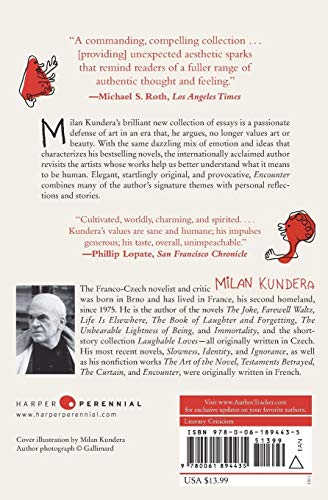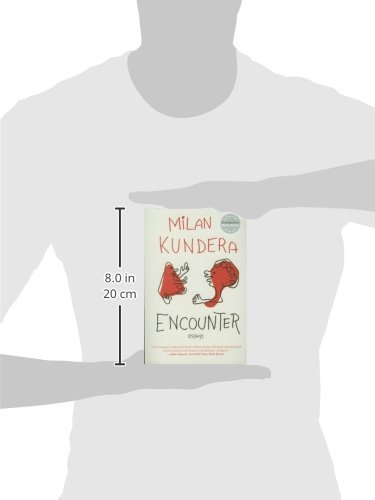Customer Services
Copyright © 2025 Desertcart Holdings Limited




Encounter
C**R
the insights of kundera
kundera’s style reminds me of the work of montaigne, the man who contemplated and developed his opinions of what interested him into what, thanks to him, has become known as the essay. to begin with a thought, to jot down an insight while it’s fresh, there’s a rawness about that, ripeness is not always all. with their kafkaesque sensibility and more accessible than nietzsche’s aphorisms, kundera’s brief pieces do share such company.born in czechoslovakia, as a writer kundera experienced his country invaded by the soviets in 1968, a shock to the western world who watched the advent of some of the new art scene in 1964 at the world’s fair in new york at the czechoslovakian pavilion. a published novelist, kundera settled in exile in france in 1975 where he continues to write. he purports to be a french writer writing of czech experiences. the thought central to his essays is the encounter of two cultures to form an identity or solidarity.in discussing the right of writers to choose their own forms, here are some of the authors, novels and observations subject of his essays: the spirit of the odd novel by rabelais is more meaningful in translation to czech readers than to contemporary french readers; the anti-novel, written by carlos fuentes and curzio malaparte, which kundera champions as the arch-novel; an insightful placing the fiction of philip roth, who continues to remind the press he is an american novelist who writes of jews and not a jewish novelist, within the literary history of sex and love in the novel; aime cesaire and other martinique born artists and the important encounter which occurred between them and the artists of the french surrealist movement; and of laughter, the different forms of laughter in a work by dostoievski and the right of the artist to depict laughter in a work under a harsh regime. other writings highlight musicians, beethoven, schoenberg, and xenakis, among them, and a psychological observation of a painting by francis bacon with a reflection of an incident told by kundera of an encounter with a friend, a woman, interrogated in czechoslovakia.his devotion to the freedom of the artist and defense of artistic form outside traditionally accepted notions of what a novel, in general, is expected to be, plot driven with characters engaged, is best expressed in his description of modernism as he refers to the novels by malaparte: ‘…there are many great novels that, at their birth, are unlike the commonly held idea of the novel. And so? Isn’t a great novel great precisely because it does not repeat what already existed? … And I find it significant that everything about THE SKIN’S form that seems to contradict the very idea of the novel should also reflect the new climate in the aesthetic of the novel as it took shape in the twentieth century, in contrast to its norms in the century before. For instance: all the great modern novelists had a somewhat distant relation to story in a novel, no longer considering it to be the indispensable basis for ensuring unity in a work. So the striking feature of THE SKIN’s form is that the composition does not rely on a story, on any causal sequence of actions.’through his essays, kundera offers an overview of authors of fiction who have treated the novel as novel, and tells us of places where the reception of works by those with power can destroy what does not meet their approval, and silence, imprison, exile and kill the artists.
B**N
More on the Novel as Art
Wonderful followup to "The Curtain". Rich in it's examination of the novel, but also moves into painting, music, and poetry.Mainly a defense of writing as art, especially with the examination of Malaparte and contrasting his work to Sartre's quote: "Prose is in essence utilitarian...the writer is a speaker: he designates, demonstrates, orders, rejects, questions, entreats, insults, persuades, insinuates."Both in Malaparte's excerpts and Kundera's explanations, we find that writing can move far beyond utilitarian, in his last paragraph:The war's closing moments bring out a truth that is both fundamental and banal, both eternal and disregarded: compared to the living, the dead have an overwhelming numerical superiority, not just the dead of this war's end but all the dead of all times, the dead of the past, the dead of the future; confident in their superiority, they mock us, they mock this little island of time we line in, this tiny time of the new Europe, they force us to grasp all its insignificance, all it's transience...
N**L
whose analysis of contemporary times and the role the novel plays in showing us our lives is brilliant.
No one, no one, no one knows more about the novel than Kundera. Maybe this isn't up to the lofty standards of Art of the Novel but it's well worth your time. You know, Kundera might just be one of the world's smartest, most observant people... someone whose writing in impeccable... whose analysis of contemporary times and the role the novel plays in showing us our lives is brilliant.
M**A
Kundera Kontinues Kritiques
Milan Kundera continues his penetrating cultural commentaries with ENCOUNTER. The only drawback for this American is Kundera's focus on less well-known European writers and history.
P**E
Milan Kundera Book
I love Kundera's fiction, but did not realize this book is more of an art analysis so I was dissapointed.
J**S
A Very Nice "Encounter" with Milan Kundera
Every now and then a book comes along that makes you pause and say to yourself "why have I not read more by this author." "Encounter" by Milan Kundera is just this book. I picked it up after seeing that it was named one of the NY Times Notable Bookes of 2010 and I was not dissapointed. Kundera as people know is a Czech writer who was exiled in 1975 and has lived in France every since. His books were banned by the old Czechoslovakian Communist government until 1989 when the Velvet Revolution hit and the country was opened up again.This book, which in truth is a collections of stories and thoughts by Kundera, reminds me most of "The Book of Laughter and Forgetting" which he wrote in 1979 and which tells ofCzech citizens opposing the Communist regime in various ways. In "Encounter" he spends a lot of time talking about his opnions of art and artists includign Fellini and Schoenberg as well as Francis Bacon. I was pleasantly surprised to also read a short piece on one of my favorite novelists Philip Roth. Finally, he spends a great deal of time on the Carribean island of Martinique--a place of beauty and interest--and makes it come alive to the reader. A good collection of thoughts that helps you get a bit into the mind of Milan Kundera and I highly recommend it.
O**I
Buena compra.
Uno de los títulos que me faltaban de mi autor favorito, el libro llegó sin plástico protector en buenas condiciones.
J**7
"Une Rencontre" : une invitation à lire et à relire
"Une Rencontre" s'inscrit dans la suite des précédents recueils d'essais de Milan Kundera ("L'Art du roman", "Les Testaments trahis", "Le Rideau"). C'est une réflexion qui se poursuit d'ouvrage en ouvrage : Kafka, Broch, Janacek... Lecture stimulante. Les pages consacrées à la littérature des Antilles, aux deux grands romans de Malaparte ("Kaputt" et "La Peau") et, plus surprenant, aux "Dieux ont soif" d'Anatole France (des pages qu'on peut qualifier d'élogieuses - on se souvient qu'à sa mort les surréalistes avaient "craché" sur le "cadavre" d'A. France), sont également des plus intéressantes. C'est un livre que j'ai lu d'un bout à l'autre en un après-midi.
D**S
pour comprendre qui l'on est, il faut regarder d'ou l'on vient
j'adorais déjà kundera et j'ai lu tous les livres, excepté le dernier que j'ai hâte de parcourir.comprendre à travers "une rencontre" quels ont été ses mentors et sources d'inspiration de sa propre vie et de son univers romanesque est une vraie révélation indispensable à la compréhension de ses grands thèmes existentiels & esthétiques.
A**R
Five Stars
Kundera's pen drips with lightness...
R**S
philosophie de la litérature
convient seulement aux personnes alertées sur le contenu: il donne son avis personnel sur des écrivans, peintres,musiciens,...etc, en philosphant et en se servant de l'histoire contemporaine et récente.
Trustpilot
2 days ago
4 days ago